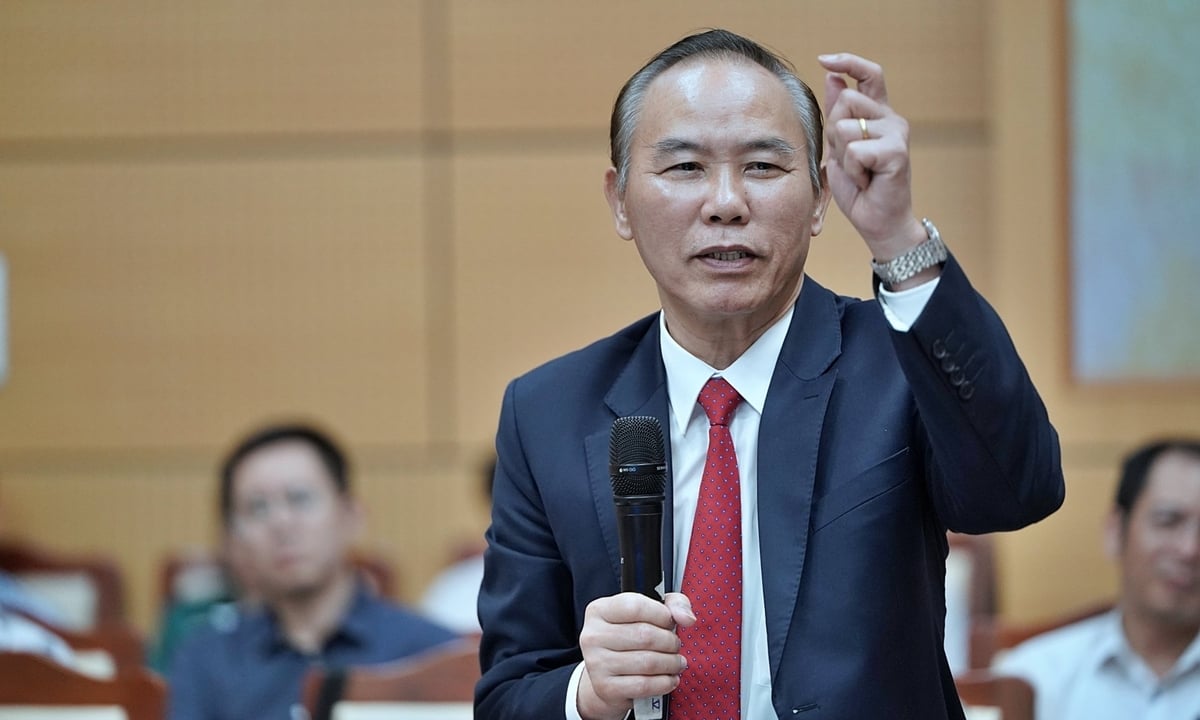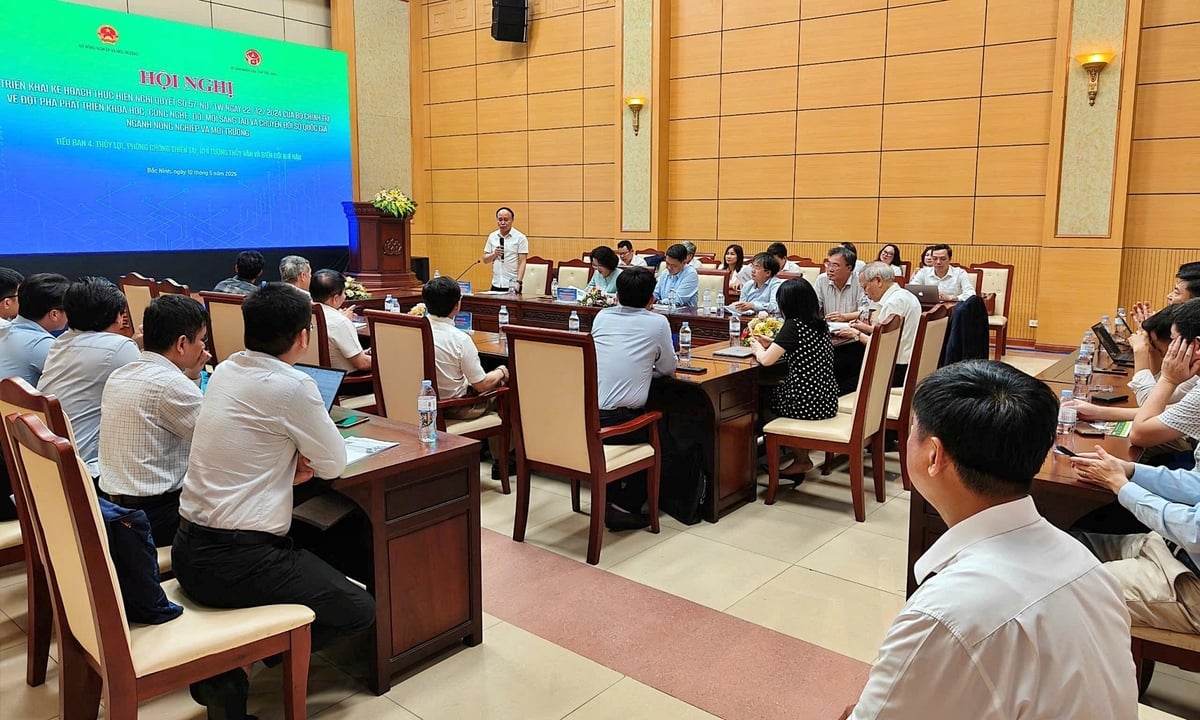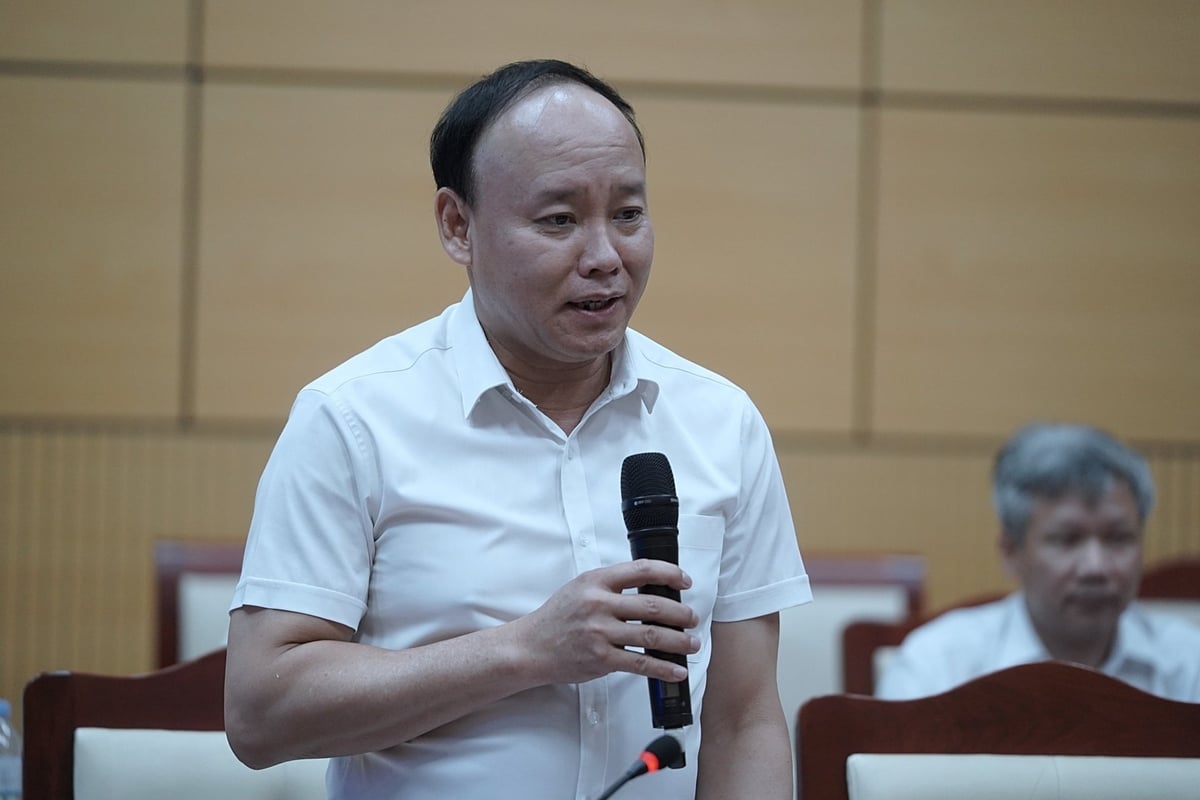December 3, 2025 | 02:11 GMT +7
December 3, 2025 | 02:11 GMT +7
Hotline: 0913.378.918
December 3, 2025 | 02:11 GMT +7
Hotline: 0913.378.918
As part of the conference on implementing Resolution No. 57/NQ-TW on breakthroughs in science, technology, innovation, and national digital transformation in agriculture and the environment, Subcommittee 4, focusing on irrigation, disaster prevention, hydrometeorology, and climate change, underscored the urgent need for structural reform in how these sectors are governed.
Technological modernization and scientific planning were emphasized as the foundation for resilience.

Deputy Minister Phung Duc Tien: 'Irrigation plays an important role in responding to climate change'. Photo: Bao Thang.
In his opening remarks, Deputy Minister Phung Duc Tien emphasized that climate change presents profound and intensifying risks, with the irrigation sector on the frontline. Increasingly erratic rainfall, flash floods, droughts, and saltwater intrusion are no longer isolated events but a wider pattern threatening national food security and social stability.
He stressed that water-related challenges are systemic, necessitating proactive and scientifically grounded responses. Management, he noted, can no longer depend on experience-based instincts alone; it must be underpinned by robust data and scenario modelling.
Despite this, the Deputy Minister remarked that many localities have yet to adopt a fundamental shift in their perceptions of irrigation and disaster management. Administrative reporting remains the norm and is insufficiently reflective of the scale and complexity of climate threats.
Calling on experts, scientists, and policymakers to move beyond the procedural loop, he urged them to propose transformative ideas rooted in scientific reasoning and practice. “It has been a long time since we have assembled such a broad spectrum of expertise. This is not just a forum for dialogue, it is an opportunity to align our vision and lay the scientific groundwork for real change,” he said.
He reaffirmed that irrigation must now be considered more than a support mechanism for agriculture. It is a structural pillar in national strategies for adapting to and mitigating climate change. In this new role, irrigation works must be designed to be flexible, adaptive, and responsive to real-time forecasting. Multi-purpose infrastructure integrating flood control, water regulatio,n and ecological protection is no longer optional. Still, the Deputy Minister added that artificial intelligence and predictive modelling must underpin this shift. He concluded: “Water must become a national priority in research. Without resolving our water problems, sustainable development will remain beyond reach.”

The meeting of Subcommittee 4 attracted the participation of many leading experts in the fields of irrigation, natural disaster prevention, and hydrometeorology. Photo: Bao Thang.
Echoing the Deputy Minister’s call, Professor Nguyen Tung Phong, General Director of the Department of Water Works Management and Construction, outlined strategic priorities for the irrigation sector in the face of climate change and the digital transition.
He advocated moving away from siloed, administrative approaches toward integrated planning that connects water management with agriculture, environmental protection, urban development, and socioeconomic resilience.
“Irrigation cannot remain an isolated discipline,” he asserted. “Its problems are interconnected with broader environmental and societal systems. The only viable path forward is interdisciplinary collaboration, where infrastructure serves multiple ends from disaster mitigation to food production and habitat conservation.”
Phong also proposed rebalancing investment priorities. Instead of diffusing resources across the board, he recommended focusing on high-risk zones suffering recurrent droughts, floods, salinization, or erosion. These critical areas, he argued, cannot afford to wait for long-term strategies; they demand immediate, science-based interventions.
He identified workforce development as a cornerstone of reform. Engineers and technical managers must be trained to think innovatively and work across disciplines. The department, he said, is committed to strengthening partnerships with both domestic and international academic institutions to develop this human capital.

Director Nguyen Tung Phong: 'Research cannot continue on a fragmented, isolated scale'. Photo: Bao Thang.
Looking ahead, Phong emphasised the importance of elevating scientific research from fragmented studies to structured programmes delivering actionable outcomes. He argued that Irrigation research must address technical bottlenecks and align with the strategic direction of national development.
“We need research that produces tangible results, solutions that can be deployed directly on the ground and offer measurable impact,” he said. “Scientific work must be in service of society, not just the scientific community.”
His remarks reflected a broader shift in governance, grounded in science, responsive to local realities, and geared towards long-term resilience. In this framework, irrigation becomes an engineering discipline and a vehicle for delivering climate security and sustainable growth.
Mai Van Khiem, Director of the National Centre for Hydro-Meteorological Forecasting, expanded on the technical backbone required to support adaptive irrigation management. He proposed four critical areas of focus: mastering core forecasting technologies, applying artificial intelligence for ensemble modelling, improving storm trajectory and rainfall predictions, and enhancing real-time monitoring.
He highlighted that intelligent monitoring systems integrating satellite data, radar and water-level sensors must be standard practice, enabling timely decisions for reservoir operations and emergency responses.
Processing big data to simulate hydrological flows and flood scenarios is equally vital. “We must ensure that early warnings are delivered to the right people, at the right time, in the right format simple to understand, platform-independent and locally actionable,” Khiem emphasised.
Translated by Huong Giang

(VAN) Con Dao National Park officially received its Green List status after it was announced at the IUCN World Conservation Congress in Abu Dhabi in October.

(VAN) The National Assembly’s inspection delegation called for a renewed approach to marine economic development, the removal of legal 'bottlenecks,' and strengthened marine environmental protection.

(VAN) The inevitable path forward is to reorganize production along the value chain, utilizing cooperatives as the core, enterprises as the driving force, and farmers as the central subjects.

(VAN) On November 28, Minister Tran Duc Thang, together with China's Minister of Agriculture and Rural Affairs Han Jun, chaired the 2nd meeting of the Viet Nam - China Agricultural Cooperation Committee.

(VAN) Forest carbon credits are only accepted when they ensure absolute environmental integrity, additionality, permanence, and transparency.

(VAN) Viet Nam partners with Beijing on controlling air pollution, cross-regional management, high-tech monitoring and relocating polluting facilities.

(VAN) With a USD 50 million investment, Australia is partnering with Viet Nam to operate its first public electric bus fleet and develop a nationwide EV charging network.